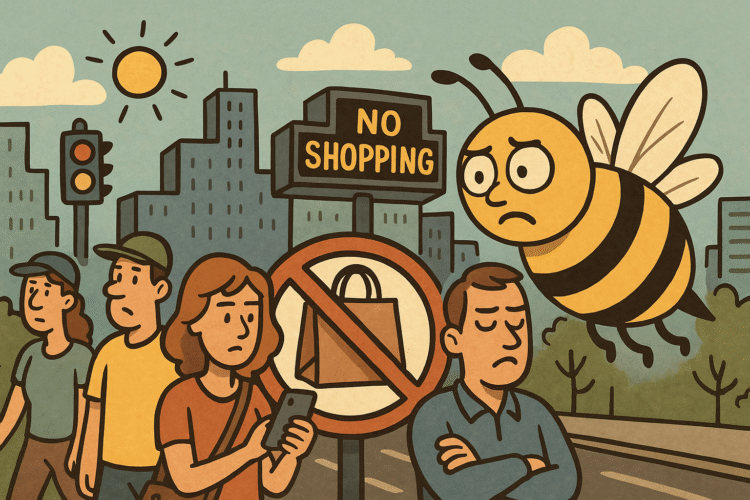
It’s August 9th, and somewhere in the depths of a Facebook group with 36 admins and one uncle named Gary, The People’s Union USA has declared a nationwide economic blackout. The instructions are simple: buy only essentials. No lattes. No Amazon impulse “must-haves” at 2 a.m. No Sephora “just to look.” Today, we flex our collective purchasing restraint until the free market’s knees buckle—or at least wobble slightly while checking the bill.
On paper, the idea is revolutionary. Stop feeding the machine, and the machine stalls. Take one day to say, “You know what, Jeff Bezos? I’ll moisturize with tap water.” But in practice, America is not known for its ability to collectively restrain itself—especially when the sale email says “Ends tonight!” and the promo code is SUMMERFUN25.
The blackout’s target is consumerism itself, though I can’t help but notice that “buy only essentials” is a phrase open to wide interpretation. Essentials for me: coffee, rent, antihistamines. Essentials for Florida Man: bulk fireworks, scratch-offs, and whatever bait the gas station clerk swears is “fresh.”
The organizers hope to send a message to corporations about inflation, wage stagnation, and corporate greed. Noble goals. But let’s not pretend CEOs are nervously watching the dashboards today, muttering, “Oh God, Janet didn’t buy her Tuesday venti—this could be it.” The sad truth is that corporate America has a whole buffet of strategies for keeping their quarterly bonuses intact: surge pricing, layoffs, and the perennial favorite—charging you more for less product while slapping a “New Look!” label on it.
Still, movements have to start somewhere, and there’s something oddly poetic about the image of a nation collectively crossing its arms, saying, No. In theory, this could be the shot across the bow. In reality, we are a country whose Black Friday death toll has its own Wikipedia entry. Delayed gratification isn’t our thing.
If anything, the blackout will be most effective at revealing just how far we’ve stretched the definition of “essential.” DoorDash sushi on a random Thursday? Essential. Streaming subscriptions you forgot you had but might use someday? Essential. A giant Stanley cup because the influencer said hydration is the new skincare? Absolutely essential.
The irony here is delicious: to successfully protest consumerism in America, you have to… advertise it. Social posts, hashtags, graphics, merch for your anti-mercantile movement. The revolution will not be televised, but it will be on Etsy.
I’m not dismissing the frustration fueling this stunt. People are squeezed—paychecks feel lighter, rent feels heavier, and eggs now come in luxury packaging. But as a tactic, one blackout day feels like asking a billionaire to notice you deleted your Amazon cart before checkout. You’re not disrupting the system; you’re giving it a spa day.
If the organizers really want to scare corporate America, they should aim for something more insidious: the slow bleed. Stop buying for a month. Six months. A year. Trade, thrift, repair. Watch profits shiver, and watch shareholder Zoom calls get awkward. But that’s harder. It’s easy to be a rebel for 24 hours. It’s harder to live like one.
And maybe that’s the uncomfortable truth. We want to fight the system while still enjoying same-day delivery. We want a moral stance that doesn’t mess with our comfort. And the corporations know it. They’ve built an economy where our inconvenience feels like a crisis and their crisis feels like a stock market adjustment.
Today, some people will genuinely resist. Others will buy “essentials” that look suspiciously like patio furniture. And tomorrow? The machine will hum again, sleek and smug, sending you a targeted ad for something you swore you didn’t need—until you remember you deserve it.
Final Thought: In a country where capitalism is both the poison and the IV drip, a one-day economic blackout is less a revolution and more a smoke break for your credit card.